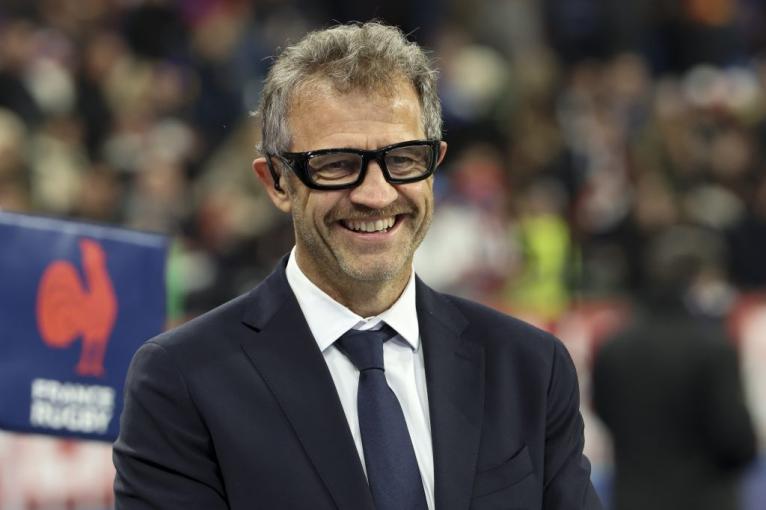From the moment the Stade de France darkened, thousands of mobile phones twinkled like stars in the night, as if in a reproach. It was compulsive viewing. The marching band did not even bother finishing La Marseillaise, they stopped playing after the first verse. The 82,000 packed to the stadium rafters rose to their feet and embraced the present. ‘No accompaniment needed’ as the telly commentary observed reverentially.
Then silence, and a respectful hush for Kapa O Pango. A challenge given and received without prejudice. ‘Paris by night, the haka by night. It might just catch on’ came the response. That is the way it is with France versus New Zealand in the modern era. There is no need for extra flourishes or an added dab of marketing gloss. The game advertises itself, and the real remains the real, without hyperbole.
That is why national coaching supremo Fabien Galthié should urgently rethink his policy of deselecting the top 20 French players for the 2025 tour of New Zealand. It is now five months since Galthié made it plain the 2027 World Cup was at the apex of his forward planning, and a visit to the Land of the Long White Cloud sounded more like an afterthought. Here are his words from an interview with French sports newspaper L’Equipe:

“We follow 100 players but we have identified a ‘premium’ group of 20.
“We want them to have consistent development. We want to work hand-in-hand with the league and the clubs. Our goal is for players to be able to give the best of themselves in the French team, but also in-club. We want to go further [nationally], while taking into account the challenges of the clubs.
“Players will benefit from four mandatory weeks off, and four weeks without matches. We built on trust while adjusting the management of the international season by choosing to rest our ‘premium’ players during the summer tours.
“It was a first step. We want to go even further, which will mean we will go on tour in the summer of 2025 in New Zealand without our ‘premium’ players. It’s been like this for four years. Why change strategy? Because we’re travelling to the All Blacks? You have to be consistent.”
The charm of the France-New Zealand encounter lies in its vivid contrasts and the brightness of its colours, it is like the rugby equivalent of a painting by Paul Gauguin. The diversity as exotic as the painter’s life and work in his adopted home of Tahiti.
France’s domestic league plays 26 regular season games and lasts for almost 11 months of the annual calendar, New Zealand’s has only 14 and the professional season is all over within four months. In France, club governance is the responsibility of an independent organisation [the Ligue Nationale de Rugby or LNR] which is entirely separate from the host union [the Fédération Française de Rugby or FFR]. Down south New Zealand Rugby runs the provincial and the national game.
In the shaky isles the professional pyramid tapers to a point with the almighty All Blacks. In France the feeling for country is no more important than the sense of fierce local identity spawned at myriad clubs concentrated in the southwest. Progress is achieved by a nonchalant shrug and the wide sweep of nuanced negotiation, rather than driven from the top by a single intense focus.
The seductive allure of the meeting point between the two lies in the strangeness of the taste for both. It really is like entering another rugby country, and the foreign contains the charm. That is why Galthié’s words provoked such outrage in New Zealand, and why the two nations will fall in love again just as readily if he changes his mind. Think of the upsets at two World Cups in 1999 and 2007, or the ‘try from the end of the earth’ in 1994. A true love affair needs its separations and its unions, its goings as much as its comings.
It was no different on Saturday night. The contrast between the explosive, ultra-physical, burst-based Top 14 style, and the aerobic, sustained skill excellence of Super Rugby was highlighted in dark blue and white. New Zealand built almost twice the number of rucks as their hosts [a massive 142 to France’s 75 – sitting right on the Top 14 average of just over 76]. They doubled the number of line breaks [eight to four] and carried 92 more times than their opponents. The All Blacks crashed through the four-phase barrier on seven occasions to France’s once.
Somehow, it was not enough. After an irresistible two-try head start, the All Black failed to register another try in the last 53 minutes; an unwanted echo of their Rugby Championship drop-off in second-half performance, as a French résistance master-minded by defensive guru Shaun Edwards eventually subdued the Kiwi attack.
It all looked so picture perfect early on. The All Blacks started by quieting the crowd and attacking France at their strongpoints in the set-piece, at lineout and at scrum. New Zealand were the beneficiary when France lost all 138kg of starting tight-head Tevita Tatafu and had to replace him with La Rochelle monster Georges-Henri Colombe. Colombe is slightly heavier than Tatafu but crucially he is five inches taller, and that gave young hustler Tamaiti Williams all the leverage he needed at scrum time.
The young Crusader still struggles to solve the puzzle posed by the shorter, more compact tight-heads at this level but he had no problem at all with Colombe. He forces the Stade Rochelais giant up and out of initial position at ‘set’ and that pressure feeds along the line to Greg Alldritt at the base, with Cam Roigard able to rob the number eight and capitalise immediately for the try. If Ethan De Groot is under any illusions about the tenuous nature of his hold on the number one jersey, this performance by ‘mighty Tamaiti’, both in and out of the set-piece, will have dispelled them completely.
If anything, Tupou Vaa’i is developing even faster than Williams at the same age, and New Zealand can justifiably lay claim to having the most threatening lineout defence of any in the international game at present. The All Blacks won three of France’s first four throws and the contrasts were plain to see. Top 14 lineouts – unlike their Super Rugby counterparts – are movement-based, with plenty of pre-throw shifts designed to confuse the opposition and allow the hooker to float the ball gently into an undefended space.
Keep your eyes on Vaa’i. In both instances there are three moves before the throw, but the All Black has eyes only for Emmanuel Meafou entering from the ‘+1’ spot as acting scrum-half. He knows Les Bleus want to use their tallest and strongest man as a back-lifter, and when he moves, Vaa’i moves too: first as a lifter, then as a counter-jumper.
It was the only area of the game in which the All Blacks got the better of the super-sized Toulousain leviathan. Super Rugby forwards may still be faster, but they are definitely smaller, and Meafou has the skills to go with his size and strength.
If you have a forward of 6ft 8ins and 145kg, and he is not at all disturbed by a dysfunctional set-piece, you are in business. In the second of these two clips it takes five Kiwi tacklers to bring down the big blue bear, and by the time he finally accepts the tackle he has set a ruck deep in the New Zealand 22. Les Bleus were able to sit on that position long enough to build a lineout drive which again featured the naturalised Aussie behemoth at its epicentre.
France have done their due diligence at the half-time break and Meafou is no longer part of the lifting combination on Alexandre Roumat. Instead, he becomes the focal point of a shift-drive at the front of the line. It quickly becomes obvious that as well as he can read the big man in the air, Vaa’i is no match for his power on the ground. Even in reverse, Meafou is like a tractor motoring backwards in low gear, trampling all in its path.
A high-level offence will often try to identify and exploit big forwards who can be slower to reload, and therefore vulnerable to two quick plays run at them consecutively. Midway through the first period, the All Blacks had no such luck when they ran at Meafou twice in a row.
No sooner has the big French number five pancaked Will Jordan on a kick return, than he promptly gets back on his foot in time to splatter Jordie Barrett all over the plush Parisian turf on the very next play.
The phase that followed was somehow symbolic of New Zealand’s current standing in the global game.
A subtle tip-on pass from Scott Barrett springs mighty Tamaiti through a gap not even Meafou can cover from his post on the inside, but the French defence is quicker to regroup after the break than the New Zealand support, and the bleeding stops immediately with a turnover at the breakdown courtesy of Peato Mauvaka.
What wouldn’t the New Zealand rugby public give to see the likes of Mauvaka and Meafou up front, and Damian Penaud, Louis Bielle-Biarrey behind visiting their shores next July – without even whispering the name of ‘the best player in the world’ into the bargain?
If South Africa is New Zealand’s long-time rugby ‘wife’, France is her mistress, living in the shadows. Smashing plates and making a scene; usually difficult and demanding in public, always desperately seeking another passionate reunion in secret. It’s up to Galthié et frères to make it happen, to reignite one of rugby’s great love affairs.


Comments
Join free and tell us what you really think!
Sign up for free